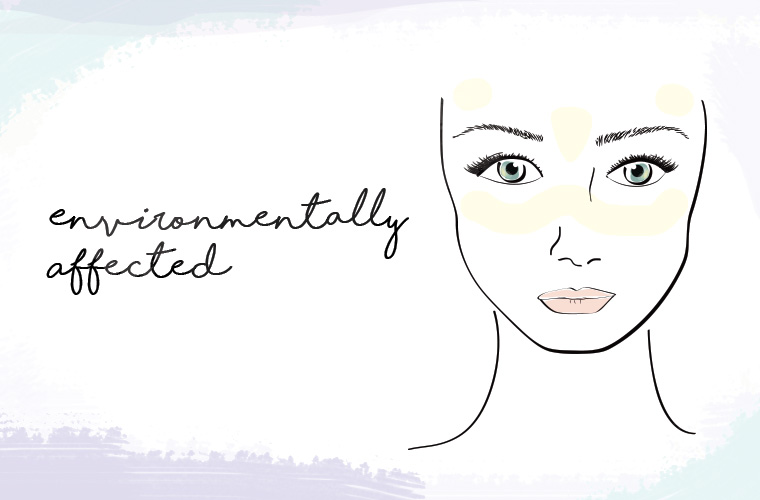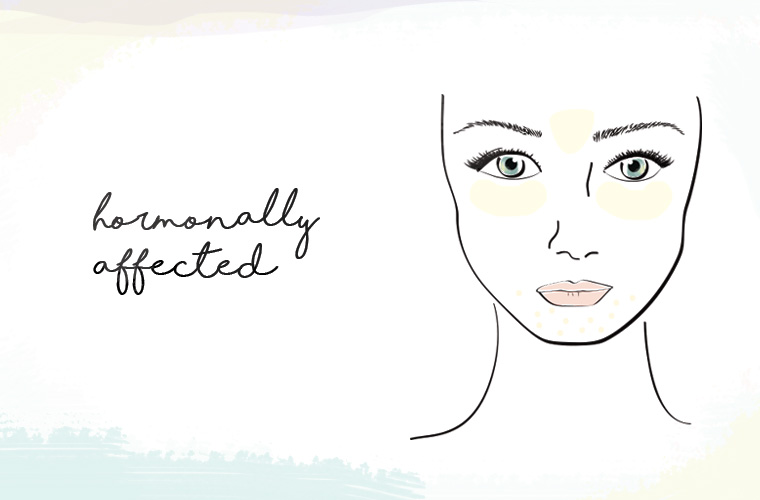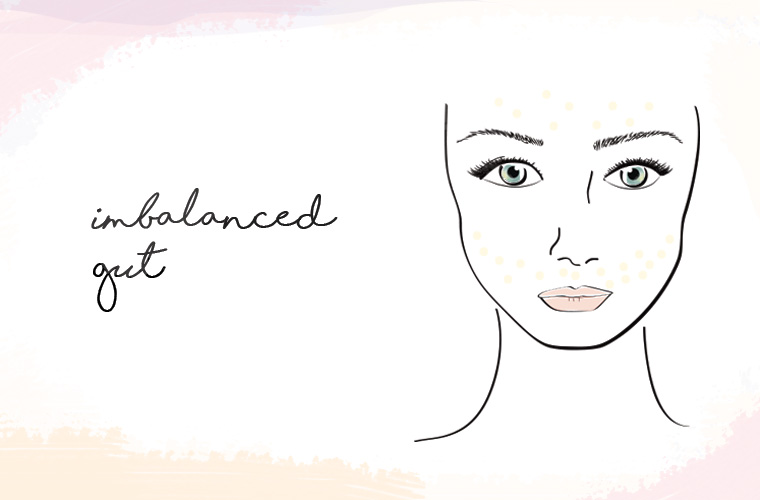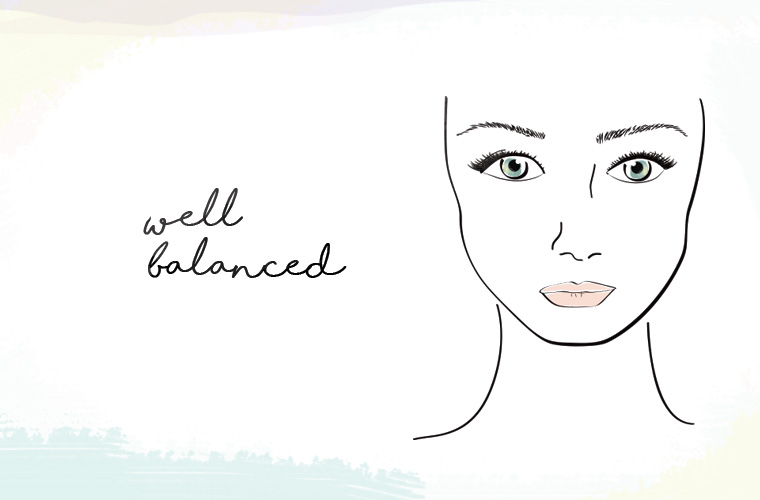How to “Read” Your Face to Decipher the Root Cause of a Breakout
Being able to read body language is a crucial life skill. And that applies to understanding the messages you're sending yourself—because when acne strikes, it's usually your body trying to tell you something's up.
Everything from the type of breakout to where it's located on your face has its own meaning; you just have to learn how to interpret it.
Not familiar with reading that kind of body language? Don't sweat it! We consulted two experts in face mapping—a traditional Chinese Medicine technique that links areas of the face with various aspects of internal health—to find out how to listen to what your skin is telling you.
"After 10 years of giving facials, it's become really clear to me how the skin is a guide to internal health," says Hayley Roy, a Los Angeles-based therapeutic skin coach and certified aesthetician who teamed up with bicoastal holistic nutritionist and health coach Tara Curran at a recent "Skin Food Talk" at Bandier in New York City.
Roy, who has studied Ayurveda, adds: "Tara's confirmed the connections with her nutritional counseling. So although the basis of face mapping comes from both Ayurveda and Chinese Medicine, the face maps we've created were customized by us."

{{post.sponsorText}}
Let's just say their workshop made me want to start being diligent about what I eat and doubling down on my skin care routine—because once you know what causes something, you can avoid it. And I'm all about ghosting my pimples.
Ready to play skin detective? Keep scrolling to learn the three major root causes of acne and how to heal them, plus tips on staying in balance—once and for all.

1. Environmentally affected
Though urban air and other environmental stressors affect every city dweller, some people tolerate the onslaught better than others.
If your skin issues are caused by environmental toxins, you might see blemishes between the eyebrows and on the temples, in the eye area, and on the apples of the cheeks crossing over the nose. In this instance, your body could be telling you that your liver is stressed (Roy says this can cause inflammation around the temples), your kidneys or thyroid are imbalanced (which can lead to eye puffiness and darkness), or your vascular system is under pressure (which may be connected to the flare-ups on your cheeks).
And while you can't do anything about pollution, you can protect your skin and help your body process toxins with the right facial oils (the duo recommends shopping for them at CAP Beauty and The Detox Market) and superfoods.
Roy's recommended topical treatments:
- "You'll want a vitamin E-based topical solution," says Roy. "This fights [free] radicals."
- Look for essential fatty acids in your serums and cleansers, which keep your cell membranes strong and healthy.
- Zinc is key—not only is it a physical sunblock, but it's also anti-inflammatory.
- Seek out products with aloe vera, which cools and calms redness.
- Rose oil is another calming ingredient. "You just need one drop," says Roy.
- Immortelle helps repair damaged skin, according to Roy. Added bonus? "It's like natural Botox," she says.
Curran's diet suggestions:
- Eat the rainbow: rich-colored veggies and leafy greens are high in free radical-fighting antioxidants.
- "You want to alkalize your body—don't eat acidic foods when breaking out from [environmental stressors]," says Curran. (Here's a list of the worst offenders).
- Eat plenty of healthy fats and omega-3s. "Use coconut oil when cooking. I even like to add it to my coffee," says Curran.
- Get lots of exercise to sweat out the bad stuff. (Science backs this one up).
- "Start your day with lemon water or dandelion tea" or end the day with dandelion tea, Curran advises, as these support your liver's cleansing function.

2. Hormonally affected
If you're anything like me, you're a little too familiar with the monthly appearance of cystic acne around the jaw line—the deep-rooted, long-lasting kind that's largely due to hormones.
Hormonal acne can also show up between the eyebrows, on your temples, and around your eye area because of hormonal changes that happened each month, which can stress the liver, Roy says. Cysts that appear from the corners of the mouth and directly down to the chin could represent imbalance in your colon, and can manifest as excess mucus clusters and angry, red cysts, she says.
Roy's recommended topical treatments:
- Argan oil has tons of dermis-healthy omegas, according to Roy.
- Rather than retinol, Roy suggests using rosehip seed oil because it's safer for sensitive skin types. "It still gives the [cellular] turnover of retinol, but it's more gentle," she says.
- Willow bark extract—AKA salicylic acid—is a potent anti-inflammatory and helps unclog pores.
- Enzymes are your friends! They are gentle exfoliators. Some of examples of ingredients to look for (but not to use all at once) are: lactic acid, honey, pineapple, and papaya.
Curran's diet suggestions:
- Reduce sugar by adding leafy greens and healthy fats to reduce cravings, says Curran. Not that you have to give up sweets completely—she recommends opting for honey, dates, or fruit instead of the processed stuff.
- Magnesium supplements are key for hormonal health, says Curran, and most of us are deficient.
- Maca and B-vitamins help balance hormones, according to Curran.

3. Imbalanced gut
The gut is the root of lots of health problems, including acne. An imbalanced gut can show up on the forehead (which might indicates problems in the small intestine); below the cheekbones, from nostril to ear lobe (this could suggest a stomach imbalance); or the upper lip (another sign of possible stomach woes).
Roy's recommended topical treatments:
- Again, rosehip seed oil is great for boosting cellular turnover in those with acne-prone skin, says Roy.
- "Carrot seed oil is an ingredient with a huge [array] of vitamins, and it gives you a gorgeous [cellular] turnover," says Roy. (Added bonus: it also contains natural SPF).
- Roy's also a fan of Buriti oil, which comes from a Brazilian nut and is an excellent, anti-inflammatory source of vitamin A.
Curran's diet suggestions:
- Curran's number-one supplement suggestion for gut-related acne: Probiotics. "I recommend 1-2 per day," she says.
- Fermented foods, like cabbage, kimchi, and sea algae, promote healthy gut bacteria.
- Bone broth helps repair a damaged gut lining.
- Reduce dairy, which can cause gut inflammation in some people.
- Avoid hot and spicy foods (it's an Ayurveda thing).

4. Well-balanced
We're all constantly striving to have clear, glowing skin. If you're already there—congratulations!—Roy still has some golden rules for you to follow. "Try to see a facialist at least once a quarter, always wear SPF protection, and consult with your skin-care specialist for advice on how to switch up your skin care products by the season," she says. "Lots of consistency in your skin care routine is really important."
Roy's recommended topical treatments:
- Antibacterial, fatty-acid rich coconut oil is "magical" for balanced skin, says Roy. "Slather it on your body, drink it, ingest it." (Here are 14 beauty-related tricks to get you started.)
- Opt for products without crazy-long ingredient lists. The simpler, the better, according to Roy.
Curran's diet suggestions:
- Eat seasonally—visit your local farmers' market and eat what's vibrant right now, says Curran. (Maybe consider picking up some skin-friendly herbs while you're there.)
- The nutrition pro also recommends adaptogens when it comes to maintaining good skin. "Ashwagandha, for example, is great for stress and your endocrine system," she says. "Tocos [from rice bran] is another one I love. This helps with detoxifying your body and your skin."
Have you heard that a clean revolution is stirring up the world of beauty products? Read up on the issues and get involved to ensure a healthier future for the skin-care aisle.
Loading More Posts...